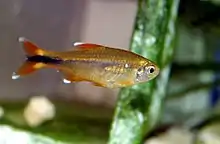Hasemania
Hasemania is a genus of characins endemic to Brazil, where only found in river basins that originate on the Brazilian Shield, ranging west to the Juruena system, north to the São Francisco system and south to the Paraná system.[1][2] The individual species generally have quite small ranges and two, H. crenuchoides and H. piatan, are considered threatened by Brazil's Ministry of the Environment.[3]
| Hasemania | |
|---|---|
 | |
| Hasemania nana | |
| Scientific classification | |
| Domain: | Eukaryota |
| Kingdom: | Animalia |
| Phylum: | Chordata |
| Class: | Actinopterygii |
| Order: | Characiformes |
| Family: | Characidae |
| Subfamily: | incertae sedis |
| Genus: | Hasemania Durbin, 1911 |
They are small fish, up to 2.7–7 cm (1.1–2.8 in) in standard length depending on the exact species.[1]
The genus is named for zoologist and explorer John Diederich Haseman. He collected all of the known species of this genus.[4]
Species
There are currently 9 recognized species in this genus:[1][2]
- Hasemania crenuchoides Zarske & Géry, 1999
- Hasemania hanseni (Fowler, 1949)
- Hasemania kalunga Bertaco & F. R. de Carvalho, 2010
- Hasemania maxillaris Durbin, 1911
- Hasemania melanura Durbin, 1911 (Copper tetra)
- Hasemania nambiquara Bertaco & L. R. Malabarba, 2007
- Hasemania nana (Lütken, 1875) (Silvertip tetra)
- Hasemania piatan Zanata & J. P. Serra, 2010
- Hasemania uberaba J. P. Serra & Langeani, 2015
References
- Froese, Rainer and Pauly, Daniel, eds. (2018). Species of Hasemania in FishBase. October 2018 version.
- Serra, J.P. & Langeani, F. (2015): A new Hasemania Ellis from the upper rio Paraná basin, with the redescription of Hasemania crenuchoides Zarske & Géry (Characiformes: Characidae). Neotropical Ichthyology, 13 (3): 479-486.
- ICMBio (Ministry of the Environment, Brazil): Portaria MMA nº 445, de 17 de dezembro de 2014 Archived 2022-05-03 at the Wayback Machine. Lista de Especies Ameaçadas - Saiba Mais. Retrieved 1 December 2018.
- "Order CHARACIFORMES: Family CHARACIDAE: Subfamily STEVARDIINAE + Incertae sedis". The ETYFish Project.
This article is issued from Wikipedia. The text is licensed under Creative Commons - Attribution - Sharealike. Additional terms may apply for the media files.